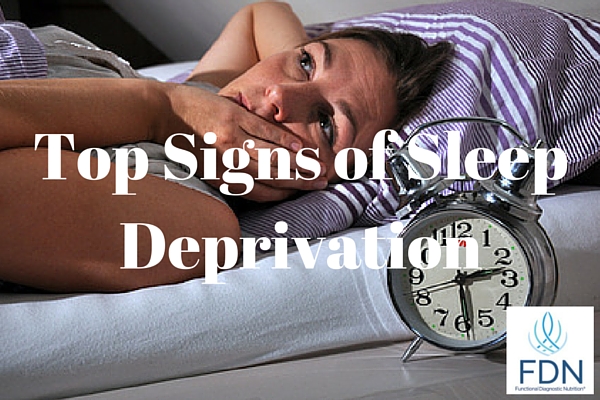Getting plenty of quality sleep is critical for health and a vital part of keeping your body functioning at its best. However, with overloaded schedules, far too many obligations, and rising stress levels, a majority of people are not getting enough sleep each night. Having an occasional late night out won’t affect your health negatively. Staying awake late on a regular basis, though, is when it becomes a problem. The body requires 7-9 hours of sleep a night in order to work optimally, and yet many are only getting 4-5 hours a night. It is estimated that as many as 70 million Americans suffer from a sleep disorder, and most sleep disorders go undiagnosed. This means that millions of people are walking around each day suffering from chronic sleep deprivation. If you feel that this may be you, here are the signs that you should look for.
- You are fatigued – this symptom is plain common sense, and yet people overlook it every day. They opt instead to attempt to energize themselves with caffeine and sugar in order to get through each day. Pay attention to see if you are feeling sleepy and fatigued. If you are, then it may be time to push yourself to get to sleep a little earlier.
- You are always hungry – if you can’t get enough energy from sleep, then your body will try to get it any other way that it can. The next best option will be for it to gain energy from the foods that you eat, and so you will notice an increase in appetite in order to meet the body’s need for energy. Too little sleep increases production of the hunger hormone ghrelin. When levels of this hormone get too high, then you will find yourself craving high fat, sugary foods.
- You’ve gained weight – It makes perfect sense that if you are always hungry that weight gain will soon follow. But sleep deprivation also directly impacts metabolism and makes weight gain much more likely. Too little sleep can also have an impact on the ability of your fat cells to respond to insulin, according to a 2012 study from the Annals of Internal Medicine.
- You are clumsy – when you don’t get enough sleep, your motor skills become impaired and your coordination is affected. This leads to more trips, falls, spills and minor accidents.
- You are more emotional – When you do not get the sleep that your brain needs, it is easy to become over stimulated and react to emotional stimuli in an exaggerated way. You may find an increase in anger, frustration, sadness, anxiety or even giddiness. When sleep deprived, it is much more difficult to control emotions as well and you may more easily project emotions outwardly and have less of an emotional filter.
- You get sick more frequently – when you don’t get enough sleep, it lowers your immune system so that not only will you have more trouble fighting off colds and flu, but it can take a longer time to recover from a nasty bug if you do get one. When you sleep, the body produces cytokines, which it uses to fight off foreign invaders like viruses and bacteria. When you don’t get enough sleep, production of cytokines reduces dramatically and your body will not have the tools that it needs to fight off the germs.
- You have trouble remembering things – sleep deprivation is exhausting for the brain and can affect both short and long term memory. A sleep deprived person will struggle to focus their attention on what information needs to be recalled and will be much more forgetful than someone who gets enough sleep regularly.
- You are indecisive – if you find that you are having difficulties managing tasks at work and home, then lack of sleep may be to blame. Sleep deprivation contributes to poor cognitive function and can reduce effective problem solving skills. In other words, it will take longer for your brain to process information and slow down your ability to make important decisions.
If you struggle with getting enough sleep on a regular basis to be at your best, following the suggestions below can help you.
- Set a regular bedtime – creating a sleep routine is important. Be sure to go to sleep at the same time each night.
- Avoid blue light and bright lights before bed – exposure to light before bed, by way of cell phones, televisions, tablets and computers will prevent the release of melatonin, a hormone that helps you fall asleep. Exposing yourself to light within 30 minutes before bedtime signals the brain to shut off production of melatonin.
- Reduce stress – stress is a major contributor to sleep dysfunction and so utilizing stress management techniques such as deep breathing techniques can help you reduce your stress levels & sleep issues.
- Avoid caffeine – caffeine is a stimulant and many people consume it throughout the day. If you are having trouble falling asleep, then you should consider only consuming caffeine before noon.
- Watch the temperature – a room that is cool is optimal for sleeping. A temperature of between 65 and 72 seems to work best for most people.
- Get enough exercise – exercise has so many benefits, but those who exercise regularly tend to have an easier time sleeping and tend to report better sleep as well.
- Watch the noise – how quiet is your bedroom? A quiet space makes for better sleep, so if you find that noise from outside the house is affecting your sleep, then try a white noise machine, fan or even earplugs.
Make good quality sleep a priority today. You will find that your health and overall quality of life will improve, your work will be easier and your relationships better.
Photo credit: Fotolia.com © Dan Race







